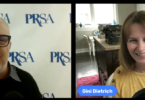Editor’s note: This is the 8th in a series of guest posts from industry thought leaders predicting key trends that will impact the public relations industry in 2014. Hosted under the hashtag #PRin2014, the series began Jan. 8, 2014, with a compilation post previewing some of the predictions.
The business of public relations is in massive upheaval as media fragments and organizations connect directly with their publics.
It’s a terrific opportunity for anybody in the public relations business that is willing to embrace change.
Yet all too often we get hung up about the future of the profession. Our colleagues in the advertising and digital have no such worries. They are getting on with it and taking our ground.
I firmly believe that the public relations professional has the most potent proposition for organizations.
We work in an editorial environment, listening and creating a narrative to enable organizations to build their reputation by earning attention. Increasingly thanks to developments in measurement and evaluation we can put a number on the value that we deliver to an organization.
Delivering on a higher purpose
The public relations profession has a higher calling. We help organizations build their reputation by promoting mutual understanding. Our profession has the potential to change the world for good through economic growth, social change and personal fulfilment.
We are helping organizations engage with internal and external publics in two-way dialogue. That dialogue is seldom easy. Increasingly you can see the evidence of those organizations getting it right, and wrong, scattered across the web.
Social media has no respect for the traditional hierarchies within an organization. Messages are shared via text, email, and social network. There is no longer any distinction between internal audiences or publics, typically employees, and external audiences.
But with the right professional expertise, communication strategies, content and engagement, employees have the potential to be the most powerful, and crucially, trusted advocates for an organization.
Public relations will incredibly valuable as a management discipline if it positions itself centre stage of the huge changes taking place in organizational communication.
Future proofing your career
Smart public relations practitioners are shifting beyond their traditional silo of corporate communications, public relations and marketing communication.
If you’re smart you’ll have a positive attitude to lifelong learning and see change as an opportunity. If you don’t, at best it will limit your future employment prospects, at worst you’ll be out of job.
Public relations may be a maturing professional discipline but unlike other areas of management we have yet to mandate the qualities that mark out other professions, such as formal qualifications and life-long learning.
Personally I can show a direct and on-going correlation between my skills and my income throughout my career. To me, there is no clearer value in education and training.
Slow march to professionalism
My view is that public relations practitioners should commit to continuing professional development. After all it’s a mandatory requirement for the professions such as accounting and legal that we aspire to sit alongside in the C-Suite.
Friends in other professions sacrifice evenings and weekends to pass qualifications and maintain their annual Continuous Professional Development (CPD) record.
My own firm Ketchum takes learning and development seriously. We’ve got our own internal university based on a CPD model and streams to support each area and level within the business.
The future of public relations starts at home with professional development. The key question is what are you doing to future proof your career and the future of the business?
Stephen Waddington is Digital & Social Media Director, Ketchum Europe , and President of the CIPR. He is the author of Brand Anarchy and Brand Vandals; and editor and contributor to Share This and Share This Too.







[…] http://prsay.prsa.org/index.php/2014/01/30/future-proofing-the-business-of-public-relations/ […]